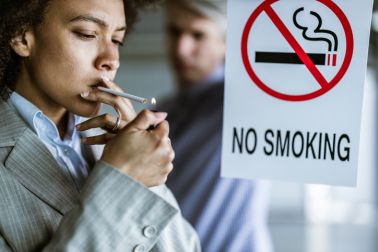
Source: skynesher / Getty
On April 29, the U.S. Food and Drug Administration (FDA) announced its plans to potentially pose product standards to prohibit menthol as a flavor in cigarettes along with other flavors that do not include tobacco.
The agency hopes the ban will help Americans kick the sinking habit and reduce tobacco-related diseases across the country while decreasing youth experimentation and addiction.
Black Americans and young smokers have been hit hard by the menthol crisis. A 2018 study by the National Survey on Drug Use and Health found that 85 percent of Black smokers preferred menthol cigarettes. Shockingly, in 2019, the FDA reported that there were 18.5 million menthol cigarette smokers ages 12 and older in the U.S, many of whom were young adults and in communities of color. If menthol cigarettes were to be outlawed, the agency estimates a 15 percent decrease in smoking within the next 40 years, helping to save the lives of 92,000 to 238,000 African Americans from smoke-related deaths.
Menthol cigarettes are disproportionately marketed to Black communities
Over the years, tobacco products have been marketed to Black communities by using deceptive advertising and misleading tactics. Companies would create exotic flavors hoping to mask the bitterness of tobacco and to make smoking more palatable for users, but a ban was quickly placed in 2009 to prevent the big tobacco industry from developing sweet-flavored cigarettes. Menthol, however, remained legal.
Phillip Gardiner, a public health researcher and activist told Slate that menthol is comparable to the “ultimate candy flavor.”
“It helps the poison go down easier,” he said. “The number one killer of Black folks is tobacco-related diseases. The main vector of that is menthol cigarettes and flavored cigars.”
The tobacco industry has been known to partner up with Black companies, leaders, and influencers in the past to help pump tobacco products and ads into the community along with publications and festivals that are popular among black audiences. In Washington D.C., the Truth Initiative found that in 2020, stores in predominantly black neighborhoods were up to “ten times more likely to display tobacco ads than retailers in areas with fewer black residents.”
Menthol dependence is higher among Black women
Black women from impoverished neighborhoods and rural communities have been disproportionately impacted by the health risks associated with menthol. A study published by the International Journal of Environmental Research and Public Health found that Black women facing tough socioeconomic barriers like low income, lack of education and health resources relied heavily on menthol and tobacco products. Many of the women smoked menthol cigarettes within the first 5 minutes of waking up in the morning. Additionally, a survey conducted with 50 women from low resource and rural communities found that regardless of the ban, only 25 percent of smokers said that they would actively quit.
Menthol has dangerous side effects
Smoking has been linked to dangerous side effects and life-threatening diseases. There a nearly 7,000 chemicals in cigarette smoke, many of which can cause severe cell damage and chronic inflammation. Carbon monoxide levels can drastically reduce oxygen delivery in the body, leading to heart problems or lung damage. Smoking also increases the risk of blot clotting and can lead to diabetes and high cholesterol. The Centers for Disease Control and Prevention notes that Black Americans are more likely to die from smoke and tobacco-related illnesses because they have higher levels of cotinine in the bloodstream. Cotinine is a product formed after the chemical nicotine enters the body. Persistent exposure to the compound can lead to bronchitis, asthma, or other diseases. Social factors can also exacerbate the issue like late diagnoses of cancers, lack of health care, and inconsistent medical treatment.
RELATED CONTENT: 6 Preventable Health Conditions That Often Go Ignored


0 Commentaires